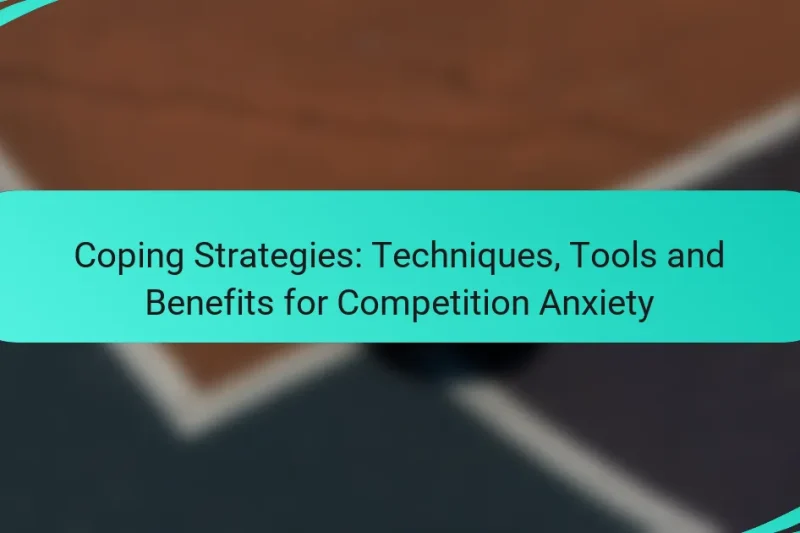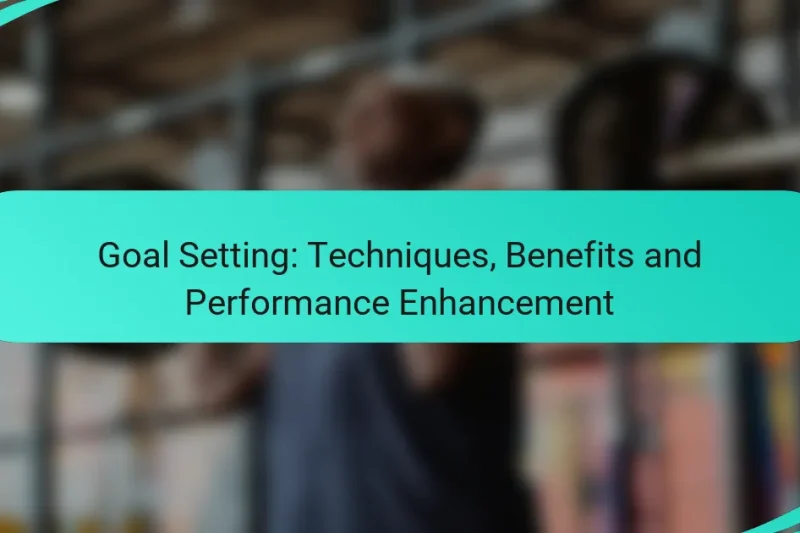Visualization techniques play a crucial role in converting complex data into clear and accessible formats, enhancing … Visualization Techniques: Methods, Benefits and ApplicationsRead more
Olympic Training Methodologies: Mental Training Techniques
Mental training techniques are essential for Olympic athletes, as they enhance focus, resilience, and performance under pressure. Methods such as visualization, mindfulness meditation, and positive self-talk not only improve mental toughness but also complement physical training, leading to superior competition outcomes. By incorporating these strategies, athletes can effectively manage stress and foster a winning mindset.
Resilience Development: Techniques, Benefits and Strategies for Young Athletes
Developing resilience in young athletes is crucial for their success both on and off the field. … Resilience Development: Techniques, Benefits and Strategies for Young AthletesRead more
Mindfulness in Olympic Training: Benefits, Techniques and Impact
Mindfulness has become an essential component of Olympic training, significantly enhancing athletes’ performance by fostering mental … Mindfulness in Olympic Training: Benefits, Techniques and ImpactRead more
Mental Training Programs: Comparison, Effectiveness and Applications in Olympic Disciplines
Mental training programs play a crucial role in enhancing the performance of Olympic athletes by employing … Mental Training Programs: Comparison, Effectiveness and Applications in Olympic DisciplinesRead more
Coping Strategies: Techniques, Tools and Benefits for Competition Anxiety
Competition anxiety can be a significant barrier to optimal performance, but effective coping strategies can help … Coping Strategies: Techniques, Tools and Benefits for Competition AnxietyRead more
Sports Psychology: Role, Techniques and Impact for Divers
Sports psychology plays a vital role in the performance of divers by enhancing their mental skills, … Sports Psychology: Role, Techniques and Impact for DiversRead more
Goal Setting: Techniques, Benefits and Performance Enhancement
Goal setting is a powerful tool that enhances performance by providing clear targets that guide efforts … Goal Setting: Techniques, Benefits and Performance EnhancementRead more
What are effective mental training techniques for Olympic athletes?
Effective mental training techniques for Olympic athletes include visualization practices, mindfulness meditation, positive self-talk, goal setting strategies, and focus and concentration drills. These methods enhance mental resilience, improve performance under pressure, and foster a winning mindset.
Visualization practices
Visualization involves mentally rehearsing athletic performances to enhance confidence and execution. Athletes can visualize themselves successfully completing their events, focusing on the sensations and emotions they would experience. This technique can be practiced daily, ideally for 10-15 minutes, to reinforce positive outcomes.
To maximize effectiveness, athletes should create detailed mental images, including their environment, competitors, and personal feelings. Using cues such as breathing techniques can help deepen the visualization experience, making it more impactful.
Mindfulness meditation
Mindfulness meditation helps athletes stay present and focused, reducing anxiety and distractions. Practicing mindfulness can involve simple breathing exercises or guided sessions lasting 5-20 minutes. Regular practice can improve emotional regulation and enhance overall mental clarity.
Athletes can incorporate mindfulness into their daily routines, such as during warm-ups or cool-downs. This practice encourages a non-judgmental awareness of thoughts and feelings, which can lead to improved performance during competitions.
Positive self-talk
Positive self-talk involves using affirmations and constructive dialogue to boost confidence and motivation. Athletes should replace negative thoughts with positive statements, such as “I am strong” or “I can achieve my goals.” This technique can help combat performance anxiety and foster a positive mindset.
To implement positive self-talk, athletes can create a list of affirmations tailored to their specific needs and practice them regularly. It’s essential to be consistent and to use these affirmations, especially before competitions or challenging training sessions.
Goal setting strategies
Goal setting strategies involve defining clear, achievable objectives to guide training and performance. Athletes should establish SMART goals—Specific, Measurable, Achievable, Relevant, and Time-bound—to maintain focus and motivation. Short-term goals can lead to long-term success by providing a roadmap for improvement.
Regularly reviewing and adjusting goals is crucial to ensure they remain relevant and challenging. Athletes can track their progress through journals or apps, which can help maintain accountability and motivation throughout their training cycles.
Focus and concentration drills
Focus and concentration drills are designed to enhance an athlete’s ability to maintain attention during performance. Techniques may include practicing under simulated pressure, such as timed trials or distractions, to train the mind to stay focused. These drills can last from a few minutes to an hour, depending on the athlete’s needs.
Incorporating exercises like meditation, breathing techniques, or specific concentration tasks can help improve mental endurance. Athletes should aim to practice these drills regularly, ideally several times a week, to build their concentration skills effectively.
How do Olympic athletes implement mental training?
Olympic athletes implement mental training through structured techniques that enhance focus, resilience, and performance under pressure. These methods are integral to their overall training regimen, often complementing physical preparation.
Regular mental conditioning sessions
Regular mental conditioning sessions are essential for athletes to develop and maintain their mental skills. These sessions typically involve visualization, meditation, and mindfulness practices that help athletes manage stress and improve concentration. Athletes may schedule these sessions several times a week, often lasting between 30 minutes to an hour.
During these sessions, athletes can practice specific scenarios they might face in competition, allowing them to mentally rehearse their responses. This proactive approach helps build confidence and reduces anxiety on the day of the event.
Integration with physical training
Integrating mental training with physical training ensures a holistic approach to athlete development. For instance, athletes might incorporate mental exercises during their physical workouts, such as visualizing their performance while engaging in repetitive drills. This dual focus reinforces both physical and mental skills simultaneously.
Additionally, athletes can use physical training sessions to identify mental challenges, such as maintaining focus during fatigue. By addressing these issues in real-time, they can develop strategies to overcome them during competition.
Use of sports psychologists
Many Olympic athletes work with sports psychologists to enhance their mental training. These professionals provide tailored strategies to address individual mental challenges, such as performance anxiety or motivation issues. Regular sessions with a psychologist can help athletes develop coping mechanisms and improve their mental resilience.
Sports psychologists often use techniques like cognitive-behavioral therapy (CBT) and goal-setting frameworks to help athletes optimize their mental performance. Engaging with a psychologist can also provide athletes with a safe space to discuss their concerns and receive expert guidance on overcoming mental barriers.
What are the benefits of mental training for athletes?
Mental training offers athletes a range of benefits that enhance their overall performance and well-being. By focusing on psychological techniques, athletes can improve their mental resilience, boost concentration, and manage stress effectively, leading to better outcomes in competition.
Improved performance under pressure
One of the primary benefits of mental training is the ability to perform well under pressure. Techniques such as visualization and positive self-talk can help athletes maintain composure during high-stakes situations. For example, practicing mental imagery before competitions allows athletes to envision success, which can translate into real-life performance.
Additionally, developing routines that athletes can rely on during competitions can create a sense of familiarity and control. This preparation can significantly reduce anxiety and enhance confidence, allowing athletes to focus on their skills rather than the pressure of the moment.
Enhanced focus and motivation
Mental training helps athletes sharpen their focus and sustain motivation throughout their training and competition. Techniques like mindfulness and goal-setting can keep athletes engaged and driven towards their objectives. For instance, setting specific, measurable goals can provide clear targets that motivate athletes to push their limits.
Moreover, maintaining a positive mindset through affirmations can reinforce an athlete’s commitment to their training regimen. This mental reinforcement can lead to improved consistency and dedication, essential for achieving long-term success in sports.
Better stress management
Effective mental training equips athletes with tools to manage stress more effectively. Techniques such as breathing exercises and relaxation methods can help reduce physiological symptoms of stress, allowing athletes to remain calm and focused. For example, practicing deep breathing before a competition can lower heart rates and promote a sense of tranquility.
Incorporating stress management strategies into daily training routines can create a more balanced approach to competition. Athletes should regularly assess their stress levels and apply these techniques to prevent burnout and maintain peak performance throughout their athletic careers.
What role do coaches play in mental training?
Coaches play a crucial role in mental training by guiding athletes through psychological strategies that enhance performance. They help athletes develop mental skills, foster a positive mindset, and create a supportive environment that encourages growth.
Developing training plans
Coaches are responsible for creating tailored mental training plans that align with an athlete’s specific needs and goals. These plans often include techniques such as visualization, goal-setting, and mindfulness exercises. A well-structured plan can help athletes systematically improve their mental toughness and focus.
For effective training plans, coaches should regularly assess the athlete’s progress and adjust strategies as needed. Incorporating a mix of mental and physical training can lead to more balanced development.
Providing feedback and support
Constructive feedback is essential for athletes to understand their mental strengths and areas for improvement. Coaches should provide regular, specific feedback on mental performance, helping athletes identify patterns and develop coping strategies. Supportive communication fosters trust and encourages athletes to share their mental challenges.
Coaches can also create a safe space for athletes to discuss their mental health. This openness can lead to better strategies for managing stress and anxiety during competition.
Encouraging mental resilience
Building mental resilience is vital for athletes facing the pressures of competition. Coaches can encourage resilience by promoting a growth mindset, where challenges are viewed as opportunities for learning. This approach helps athletes bounce back from setbacks and maintain motivation.
Practical techniques include teaching athletes to reframe negative thoughts and practice self-compassion. Coaches should emphasize the importance of persistence and adaptability, which are key traits of resilient athletes.
What are common challenges in mental training?
Mental training faces several common challenges that athletes must navigate to optimize their performance. These challenges include maintaining focus, managing anxiety, and overcoming negative self-talk, which can hinder an athlete’s ability to perform at their best.
Maintaining Focus
Maintaining focus is crucial for athletes, especially during high-pressure situations. Distractions can arise from both internal thoughts and external environments, making it essential to develop strategies to enhance concentration. Techniques such as mindfulness meditation and visualization can help athletes stay present and engaged during training and competition.
Managing Anxiety
Anxiety can significantly impact an athlete’s performance, leading to decreased confidence and increased tension. To manage anxiety, athletes can utilize breathing exercises, progressive muscle relaxation, and positive affirmations. Regular practice of these techniques can help reduce anxiety levels and improve overall mental resilience.
Overcoming Negative Self-Talk
Negative self-talk can undermine an athlete’s confidence and performance. Recognizing and reframing these negative thoughts is vital for mental training. Athletes should practice replacing self-doubt with positive affirmations and constructive feedback, which can foster a more supportive internal dialogue and enhance performance outcomes.






